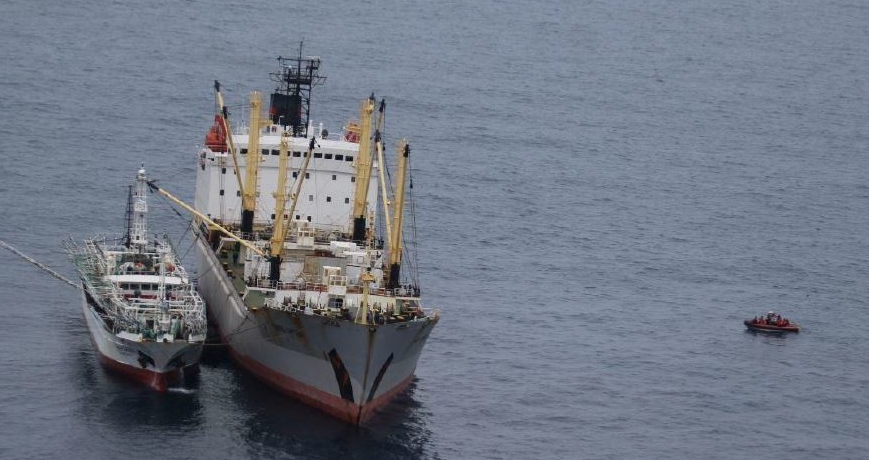A 50-year-old Coast Guard cutter is on the front line against illegal fishing on the high seas of the North Pacific, part of a growing international fight.
The cooperative effort targets uncontrolled distant-water fishing vessels, and tracks the business networks of carrier ships and fuel bunkering tankers that support them. Illegal, unreported and unregulated fishing, or IUU, operates outside the territorial waters jurisdiction of coastal nations.
But not beyond the reach of international law and cooperative regulation by fishing nations. In the North Pacific, that is what the North Pacific Fisheries Commission does.
The youngest of world’s ocean-spanning management groups, the NPFC only got started in 2015. It includes representation from Canada, China, Japan, the Republic of Korea, the Russian Federation, Chinese Taipei, the United States of America, and Vanuatu.
This summer the Coast Guard cutter Mellon, a 378’ high endurance cutter with a crew of 150 homeported at Seattle, is patrolling as part of Operation North Pacific Guard 2019, enforcing international fisheries agreements and protecting marine resources. The Mellon has served in the past conducting boardings under the rules of the Western and Central Pacific Fisheries Commission, and this is its first mission in support of the North Pacific commission.

A boarding team aboard an over-the-horizon cutter boat from Coast Guard cutter Mellon approaches a fishing vessel to conduct an at-sea boarding in the North Pacific Ocean, Aug. 13, 2019.
Commissioned in 1968, the Mellon was one of the first naval vessels equipped with combined diesel and gas turbine propulsion, for a top speed of 28 knots and 10,000-mile range at 20 knots. Once equipped with anti-submarine torpedoes and even the Navy’s Harpoon missile system, the Mellon’s capabilities now are put to use in extensive Bering Sea patrols.
On the fisheries mission since June, the crew has conducted 40 boardings and issued 61 citations, according to Coast Guard officials. Of those cases 25 were regarded as serious for “their potential to severely impact fisheries and/or blatant disregard for conservation and management measures,” the Coast Guard said in a statement summarizing the mission so far.
The most frequent violations were nine cases of improper vessel identification marking, four cases of illegal shark finning, and two instances when boarding teams found vessel monitoring systems were not being used properly or had been tampered with.
“These fisheries patrols are vital to demonstrating the U.S.’s commitment to our regional partnerships while strengthening regional maritime governance and promoting sustainability of living marine resources,” said Capt. Jonathan Musman, the Mellon’s commanding officer, in the Coast Guard statement.
“I’m extremely proud of the work we’ve done this patrol, and it’s a direct result of the hard work of this crew as well as the continued support of our international partners. Together, we’ve put in a lot of hours and a lot of work, and we’ve seen impressive results because of it.”
The NPG 2019 operation is a multi-mission effort between the Coast Guard, NOAA, Alaska Department of Fish and Game, five Pacific Rim countries and three regional fisheries management organizations.
“We’ve seen a 344 percent increase in boardings and 867 percent increase in violations compared to last year’s operation,” said Lt. Cdr. Kristen Caldwell, living marine resource program manager, Pacific Area. “This increase highlights the significance of employing differing authorities all aimed at mitigation of IUU fishing, capitalizing on a highly capable resource to maximize time on scene and the targeting of IUU vessels.”

The Coast Guard cutter Mellon patrols nearby as a boarding team conducts an at-sea inspection aboard Panamanian-flagged transshipment vessel Yung Da Fa 102, in the North Pacific Ocean, July 10, 2019. Coast Guard photo.
Through the international cooperation of the North Pacific Guard Forum (NPCGF) and North Pacific Anadromous Fish Commission's (NPAFC) enforcement coordination process, each partner nation contributes to the at-sea enforcement effort by providing surface patrols and air support for long-range surveillance.
The Mellon’s voyage also supports the U.S. national security strategy and its principle of working in “multilateral forums” with the coast guards and fisheries agencies of other nations. It also aims to support the sovereignty of developing nations, as China builds its naval and maritime commercial strength in search of advantage in the Pacific.
The 2018 National Defense Strategy calls China a “strategic competitor using predatory economics to intimidate its neighbors while militarizing features in the South China Sea.” The strategy document called to “support U.S. interagency approaches and work by, with, and through our allies and partners to secure U.S. interests and counteract this coercion.”







